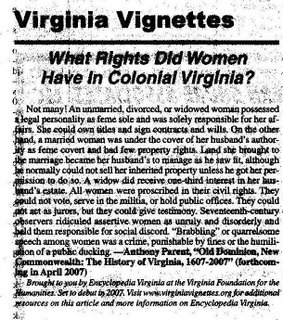
Virgina1775 - the PalTalk SI jack of all nothing - master of even less, was recenty waxing eloquently about how women in the colonies had practically all the rights men had. She read a passage or two from the New Jersey COLONIAL (1776) Constitution and offered it as an example of how colonial governments typically treated women; she imparted that women throughout the colonies had the right to vote and were generally equal to men.
Well, Vagi, ol' gal, break out the KY Jelly and a box of Twinkies - you're wrong - as usual.
As this newspaper article indicates - women were relegated to 2nd class citizens in the colonies and once married, were wholly obeisent to their men. The more liberal colonies did, indeed give their women rights the US Constitution and State Constitutions later took away, but certainly not all, least of all the Southern colonies where a more traditional political culture ruled the day.
Virginia1775 thinks by embrocating herself with a "patriotic" nickname somehow augments her prestige and fealty amongst neocon circles. Of course, we liberals are less than impressed with Virginia's chicanery. Whenever Virginia waddles her way to the mic to confer supreme unction upon George Bush and his Gas House Gorillas, I can't help but recall a passage from Ralph Waldo Emerson's Self-Reliance: "A foolish consistency is the hobgoblin of little minds."
Virginia - you little.....daaalin' - you've found your niche in life: Pandering hobgoblins!
Vac





2 comments:
http://www.ancestry.com/learn/library/article.aspx?article=2651
During the early history of the United States, a man virtually owned his wife and children as he did his material possessions. If a poor man chose to send his children to the poorhouse, the mother was legally defenseless to object. Some communities, however, modified the common law to allow women to act as lawyers in the courts, to sue for property, and to own property in their own names if their husbands agreed.
Equity law, which developed in England, emphasized the principle of equal rights rather than tradition. Equity law had a liberalizing effect upon the legal rights of women in the United States. For instance, a woman could sue her husband. Mississippi in 1839, followed by New York in 1848 and Massachusetts in 1854, passed laws allowing married women to own property separate from their husbands. In divorce law, however, generally the divorced husband kept legal control of both children and property.
In the 19th century, women began working outside their homes in large numbers, notably in textile mills and garment shops. In poorly ventilated, crowded rooms women (and children) worked for as long as 12 hours a day. Great Britain passed a ten-hour-day law for women and children in 1847, but in the United States it was not until the 1910s that the states began to pass legislation limiting working hours and improving working conditions of women and children.
Post a Comment